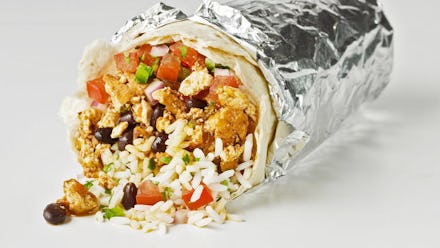Chipotle Just Launched Its First-Ever New Menu Item

The big news: Through most of its 20-year history, Chipotle has stuck to its roots. There have been minor adjustments and additions — brown rice and the burrito bowl option being the most obvious — but otherwise, the menu has stayed pretty much the same. That is until this week when the restaurant chain made a major addition to its menu: Sofritas, Chipotle's name for shredded organic tofu braised with roasted poblanos, chipotle chiles and spices.
For roughly a year, Chipotle has been working with the Oakland-based Hodo Soy company to develop an organic, GMO-free and soy-based protein that was good for the environment, vegan and, most importantly, delicious. After countless tests and tweaks, Chipotle officially added Sofritas to their New York and Boston menus this week. It's scheduled for a nationwide launch March 3, and has been well-received so far: Tofu items have already made up 3% of sales.
"We just fell in love with the product itself and came up with something that I think even if you're not a vegetarian or vegan, you could eat it and love it," Chipotle Culinary Manager Nate Appleman told Fast Company.
Although it's only been available for a few days, diners have likened Sofritas more to chorizo than tofu because of its chopped-up and crumbly — rather than spongy — texture. Plus, Sofritas are completely vegan-friendly, meaning now everyone can eat at Chipotle.
Image Credit: Fast Company
The background: Besides the push to offer more items and hopefully grab a larger market share, Chipotle adding Sofritas falls nicely in line with the company's recent branding strategy, which has slowly eased consumers away from meat towards a greater awareness of sustainable farming — though that's often easier said than done.
But the Denver-based "gourmet fast-food" chain hopes adding tofu to its menu will help not just their bottom line, but a larger societal problem: "[Selling tofu] could cut into the sales of meat and also maybe help reduce meat consumption," said Appleman. "Growing soy is less harmful on the environment than raising a cow just because the earth energy it takes to raise a 2,000-pound steer versus soybeans is completely different."
According to Mother Jones, for every 100 calories of energy put into producing conventional beef, you get only six calories back to eat. For the same 100 calories, raw soy yields 415 calories.
The takeaway: It's not too surprising that Chipotle's had this in mind. Sofritas are good for business in so many ways: First, they offer a new item that attracts new attention to the brand; second, offering a second meat-alternative item (peppers and onions are a current option) attracts new vegan and vegetarian customers and cuts into that market; and finally, selling Sofritas is not only good for your body, but good for the environment, making this a win-win situation for Chipotle. While it's been argued that soy isn't actually great for the environment, the organic and GMO-free product Chipotle uses in Sofritas is certainly better than factory-farmed meat.
After the recent launch of their Farmed and Dangerous marketing/entertainment series, it's become clear that Chipotle is doing what one wishes more companies would do: Realizing their business model could be causing environmental problems, and trying to help fix it.